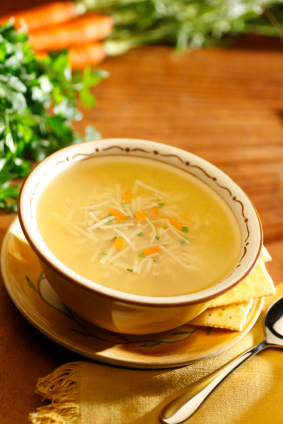With chilly winds blustering around outside, winter is the perfect time to curl up and enjoy something warm.
A mug of tea or a hearty soup can heat you from the inside and help keep the cold and the flu at bay. Whether it’s potato soup, butternut squash soup, or even split pea soup, with the right spices and vegetables you can whip up a delectable dinner recipe to warm the whole family. Here in the Savor Kitchen we try to always include these ingredients in our soups and stews to maximize health and happiness.
Ginger
Garlic
Garlic is a super seasoning to add aroma, taste, and nutrition to your recipes. Garlic and onions both contribute to immune system health as natural antibiotics, but garlic in particular is antifungal, an excellent source of manganese, a very good source of vitamin B6 and vitamin C and a good source of selenium. It has also been noted to have anti-inflammatory, antibacterial and antiviral benefits. For the best results add it in toward the end of the cooking process to retain the maximum amount of flavor and nutrition.
Miso Soups
Miso is a fermented soybean paste with a salty taste, a buttery texture. While the term ‘soybean paste’ may not immediately get your mouth watering, it’s good to note that miso supports the growth of your body’s digestive system and helps you absorb more nutrients from everything you eat by helping the body maintain a nutritional balance. It is also loaded with other nutrients like protein, vitamin B12, vitamin B2, vitamin E, vitamin K, choline, linoleic acid, lecithin, and dietary fiber along with its beneficial bacteria and enzymes.
Kale Soups
Kale is an excellent, potent source of Vitamin K, Vitamin A, Vitamin C, fiber and carotenoids, and that’s just to start. Research has also shown that kale contains 45 different flavonoids with a variety of antioxidant and anti-inflammatory effects. Meanwhile, the fiber in kale can aid digestion in general and rev up your body’s natural detoxification ability. Since raw kale can be hard on the digestive system — meaning it can cause bloating, gas and other abdominal issues — cooking it up in soup is perfect.
Lentil Soups
Lentils are a powerhouse of cholesterol-lowering fiber and provide steady, slow-burning (i.e. long-lasting) energy. In addition, they increase your energy by helping to replenish your iron. And if that weren’t enough, lentils are also a good source of manganese, protein, phosphorus, copper, thiamin and potassium.
Root Vegetable Soups
In addition to being prevalent in the winter time, root veggies are high in complex carbohydrates, which break down into sugar in your body to give you the energy and ability to function properly. They are high in fiber, and normally are low in fat as well as in calories. Additionally, they are generally high in vitamin C, beta-carotene, and contain essential minerals such as potassium, phosphorous, and magnesium. Their high amounts of antioxidants also help to remove harmful free radicals and toxins from the body.
Overall, soup can help you feel full and satisfied but not heavy or weighed down, and it’s an easy way to increase your overall vegetable consumption. Let the season of soup commence!
Hearty Soup recipes to keep you warm this winter.

